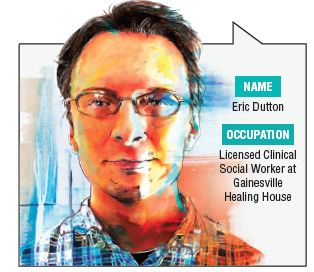NAME: ERIC DUTTON
OCCUPATION: LICENSED CLINICAL SOCIAL WORKER AT GAINESVILLE HEALING HOUSE
Eric Dutton is a licensed clinical social worker at Gainesville Healing House in Gainesville, FL. He received his master’s degree in social work from Florida State University. He works with clients ages 12 and up, many of whom have a history of childhood trauma, using Eye Movement Desensitization and Reprocessing (EMDR), mindfulness training and other approaches.
What are some of the top reasons people seek counseling?
I commonly hear about anxiety, depression, grief, relationship issues and substance issues.
Why do you think there is a stigma related to mental health? Do you think this is changing?
I think there are many reasons for this but I think that much of it is due to the stereotypes we have about mental illness. These stereotypes exaggerate the things we tend to find fascinating, strange, confusing, or scary about mental health issues and ignore the aspects that are normal and understandable.
I think there can also be a fear of abandoning ideas that attribute mental health issues to laziness, evil, stupidity, immorality or weak character. Because of this, mental health professionals deal with issues that have complicated relationships with philosophy, religion, parenting, politics and other institutions that have been trying to deal with behavior and suffering for millennia.
I have heard of being mindful, but what is it exactly?
I’ll start with Jon Kabat-Zinn’s definition of mindfulness: “Mindfulness is awareness that arises through paying attention, on purpose, in the present moment, non-judgmentally.” Looking up his name or that quote is a good place to begin if you want to understand mindfulness better. Here’s a quick example of how it can change your experience: The next time you’re eating something, spend at least a full minute chewing the first bite. Chew very slowly. Take a brief pause after every chew to feel, taste, and smell the bite you’re eating. If you feel impatient, that’s okay. Let the impatience be there, and continue noticing. Most people are surprised by how enjoyable this is. Mindfulness can enhance a pleasurable experience, but it can also reduce the suffering in an unpleasant one.
I don’t really like meditation or sitting still – can I be mindful in the car or at work?
Absolutely! Then next time you’re waiting at a stop light, turn your attention to your five senses. Feel the vibrations of the car through your hands on the steering wheel and your feet on the floor. Look past the stop light and notice the birds or clouds in the sky. Listen. What do you hear? Don’t worry about which sounds are good and which sounds are bad. Just hear them. Notice how you feel. Notice where your thoughts are. You’ll probably find this a more peaceful experience than what you usually do at a red light.
The difference between meditation and being mindful is like the difference between lifting weights at the gym and using good form when you lift a heavy bag of groceries. Being mindful and using good form when lifting are good for your health, and they can reduce the risk of suffering. Lifting weights and meditating are good for your health, but they also raise the limits of what you can accomplish with physical strength on one hand, and with mindfulness on the other.
What strategies for self-care do you recommend?
There are lots of generally good strategies, but none of them are right for everyone. For myself, I like meditation, exercise, reading, talking to friends, taking walks, and journaling. I think the biggest obstacle to self-care, though, is making and taking the time for it. We tend to put self-care at the bottom of our to-do list. Your self-care might have to come at the expense of something else. You might have to tell someone, “I’ll be ready in 30 minutes” or ask them to help you with a chore so that you can get some time for your phone call with your friend or your birdwatching or your sketching. If you can take the rush off of something, do. Don’t skip your lunch break. Instead of squeezing your self-care in, schedule around it. Reschedule things, if you have that option.
If that’s not an option for you, then squeezing may have to do in between the rare opportunities for more hobby-like activities. This is a good place for mindfulness. Here are a few things you can do. Take your hands off the keyboard and take one slow breath with your eyes closed and pay attention to how it feels in your body. Take twenty seconds to drink your glass of water instead of five seconds and pay attention to how it feels going down. When you’re walking from one place to another, listen to the sounds around you as you go. Wash your hands slowly, just to feel, see, smell, and hear the experience.
I’m not going through any major life crises but just feeling a little down. Can I schedule an appointment to talk to a therapist on my own?
Yes. That’s a perfectly good reason to talk to a therapist. You don’t need to wait until you’re feeling worse to get some help feeling better. You can call the therapist directly. Most therapists don’t require a referral from a doctor or anyone else.
What advice would you give someone who is considering therapy? What is the best way to find the right provider?
Know that you deserve help. It’s okay to start therapy for any reason, it’s okay to stop at any time, and it’s okay to change therapists.
There are several ways to find a provider. You can ask your doctor, or any health professional, for a recommendation. Ask the ones who know you best. Maybe that’s your gynecologist or your chiropractor.
If you don’t have anyone you trust for a recommendation, then you can do an internet search, you can search psychologytoday.com, or you can call your insurance plan and ask for a list of therapists who are in-network.
If you want to see a mental health professional who can prescribe medications, then you will want to look for a psychiatrist or a psychiatric nurse practitioner. Those appointments will probably be a half-hour or less and take place several weeks or months apart. If you want weekly talk therapy sessions that last about an hour, then you’ll want to look for a therapist or psychologist. Don’t worry too much about the letters after a therapist’s name. You could do a Google search for “differences between LMHC, LMFT, LCSW, and PHD,” but reading that information will be less useful than reading what the therapists say about themselves.
Read the bios at psychologytoday.com or find the therapist’s website. Find someone who sounds good to you. And know that many therapists have full schedules, so you may have to call several before you find one who has room to schedule you.
What resources are available for people who may not seek counseling due to financial restrictions?
If you have insurance, call your insurance plan and ask for a list. Search psychologytoday.com and select the options you need under the “price” tab after you’ve searched for your town or zip code. I’m on the board of a charity in Gainesville called Healing For All, so you can look us up. You can call 211 to talk to someone who can help you find local mental health services. In Alachua County, you can call the Crisis Center at 352-264-6789. You can call the National Alliance on Mental Illness (NAMI) hotline at 1-800-950-6264. You can call the national suicide prevention hotline at 1-800-784-2433. And if you think you need to be hospitalized immediately, you can call 911.
RELATED ARTICLES
Are Psychedelic Drugs the Medical Future?
Ho’oponopono: An Ancient Hawaiian Path to Forgiveness
Surviving Anorexia: One Woman’s Story


